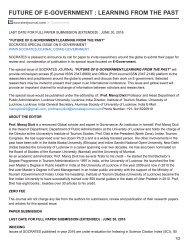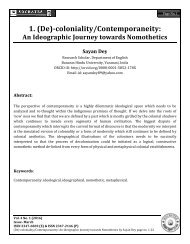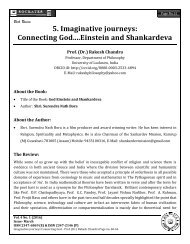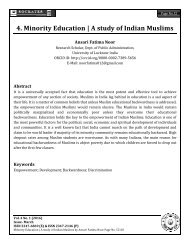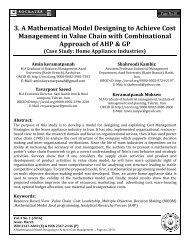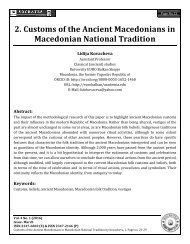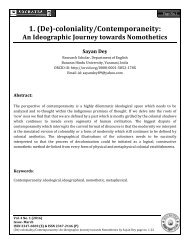Customs of the Ancient Macedonians in Macedonian National Tradition.
Kovacheva, L. (2016). Customs of the Ancient Macedonians in Macedonian National Tradition. S O C R A T E S, 4(1), 23-29. Retrieved from http://socratesjournal.com/index.php/socrates/article/view/190
Kovacheva, L. (2016). Customs of the Ancient Macedonians in Macedonian National Tradition. S O C R A T E S, 4(1), 23-29. Retrieved from http://socratesjournal.com/index.php/socrates/article/view/190
Create successful ePaper yourself
Turn your PDF publications into a flip-book with our unique Google optimized e-Paper software.
Page No.23<br />
2. <strong>Customs</strong> <strong>of</strong> <strong>the</strong> <strong>Ancient</strong> <strong><strong>Macedonian</strong>s</strong> <strong>in</strong><br />
<strong>Macedonian</strong> <strong>National</strong> <strong>Tradition</strong><br />
Lidija Kovacheva<br />
Assistant Pr<strong>of</strong>essor<br />
Classical (ancient) studies<br />
University EURO Balkan Skopje<br />
Macedonia, <strong>the</strong> former Yugoslav Republic <strong>of</strong><br />
ORCID iD: http://orcid.org/0000-0003-1652-1460<br />
URL: http://eurobalkan/academia.edu<br />
E-Mail: lidekovaceva@yahoo.com<br />
Abstract:<br />
The impact <strong>of</strong> <strong>the</strong> methodological research <strong>of</strong> this paper is to highlight ancient <strong>Macedonian</strong> customs<br />
and <strong>the</strong>ir <strong>in</strong>fluence <strong>in</strong> <strong>the</strong> modern Republic <strong>of</strong> Macedonia. Ra<strong>the</strong>r than be<strong>in</strong>g altered, vestiges <strong>of</strong> <strong>the</strong><br />
past are almost unchanged <strong>in</strong> some rural areas, as are <strong>Macedonian</strong> folk beliefs. Indigenous traditions<br />
<strong>of</strong> <strong>the</strong> ancient <strong><strong>Macedonian</strong>s</strong> abounded with numerous ritual activities, although to some extent<br />
correspond with <strong>the</strong> customs <strong>of</strong> o<strong>the</strong>r ancient peoples. However, <strong>the</strong>se practices do have specific<br />
features that characterize <strong>the</strong> folk tradition <strong>of</strong> <strong>the</strong> ancient <strong><strong>Macedonian</strong>s</strong> <strong>in</strong>terpreted and can be seen<br />
as guardians <strong>of</strong> <strong>the</strong> <strong>Macedonian</strong> identity. Although 2,000 years have passed from <strong>the</strong> ancient period<br />
to <strong>the</strong> present, and it is a bit hypo<strong>the</strong>tical to <strong>in</strong>terpret <strong>the</strong> rudiments <strong>of</strong> customs and celebrations<br />
from that time, we can allow ourselves to conclude that certa<strong>in</strong> ritual actions from <strong>the</strong> ancient period,<br />
although modified, still largely correspond to <strong>the</strong> current <strong>Macedonian</strong> folk customs and beliefs, both<br />
<strong>in</strong> terms <strong>of</strong> <strong>the</strong> time <strong>of</strong> celebration and <strong>in</strong> terms <strong>of</strong> ritual actions, procedures and symbolism. Their<br />
cont<strong>in</strong>uity reflects <strong>the</strong> <strong>Macedonian</strong> identity, from antiquity to today.<br />
Keywords:<br />
<strong>Customs</strong>, beliefs, ancient <strong>Macedonian</strong>, <strong>Macedonian</strong> folk tradition, vestiges<br />
Vol. 4 No. 1 (2016)<br />
Issue- March<br />
ISSN 2347-6869 (E) & ISSN 2347-2146 (P)<br />
<strong>Customs</strong> <strong>of</strong> <strong>the</strong> <strong>Ancient</strong> <strong><strong>Macedonian</strong>s</strong> <strong>in</strong> <strong>Macedonian</strong> <strong>National</strong> <strong>Tradition</strong> by Kovacheva, L. Page no. 23-29
Page No.24<br />
<strong>Customs</strong> <strong>of</strong> <strong>the</strong> <strong>Ancient</strong> <strong><strong>Macedonian</strong>s</strong> <strong>in</strong><br />
<strong>Macedonian</strong> <strong>National</strong> <strong>Tradition</strong><br />
Introduction<br />
Religion <strong>in</strong> <strong>Ancient</strong> Macedonia and all that it entailed (customs, ritual activities, holidays,<br />
religious, etc.), largely depended on location, which consisted <strong>of</strong> <strong>the</strong> territory <strong>of</strong> ancient Macedonia,<br />
“…country on <strong>the</strong> nor<strong>the</strong>rn part <strong>of</strong> <strong>the</strong> Balkan Pen<strong>in</strong>sula, north <strong>of</strong> Thessaly. From <strong>the</strong> east it is<br />
bordered by Thrace and Illyria from <strong>the</strong> west. It occupied areas on <strong>the</strong> bas<strong>in</strong> <strong>of</strong> <strong>the</strong> river Axios, <strong>the</strong><br />
present age,” 1 also referred to as “<strong>the</strong> country named Macedon," 2 and <strong>the</strong> climatic conditions.<br />
Accord<strong>in</strong>g to historical records, <strong>the</strong> <strong>Macedonian</strong> people who lived as vassal tribes <strong>of</strong> <strong>the</strong> highlands<br />
were satisfied liv<strong>in</strong>g <strong>in</strong> groups and spent <strong>the</strong> bulk <strong>of</strong> <strong>the</strong>ir time <strong>in</strong> <strong>the</strong> struggle for pasture land,<br />
“Dressed <strong>in</strong> sheep’s wool, which he watched on mounta<strong>in</strong>s” 3 and <strong>in</strong> secur<strong>in</strong>g farm<strong>in</strong>g, hunt<strong>in</strong>g and<br />
fish<strong>in</strong>g grounds. 4 Wea<strong>the</strong>r conditions depended on astronomical <strong>in</strong>fluences, and as well as <strong>the</strong><br />
dependence on <strong>the</strong> fertility <strong>of</strong> <strong>the</strong>y <strong>the</strong> cultivated, contributed to <strong>the</strong> development <strong>of</strong> a series <strong>of</strong><br />
rituals and customs that <strong>Macedonian</strong> farmers and herders observed at certa<strong>in</strong> periods dur<strong>in</strong>g <strong>the</strong><br />
calendar year. Most <strong>of</strong> <strong>the</strong> customs related to holiday celebrations, as was <strong>the</strong> case <strong>in</strong> o<strong>the</strong>r ancient<br />
civilizations, were centered on four astronomical phenomena: spr<strong>in</strong>g and autumn equ<strong>in</strong>oxes and<br />
w<strong>in</strong>ter and summer solstices. Certa<strong>in</strong> customs are practiced <strong>in</strong> accordance with seasonal agricultural<br />
work, such as plant<strong>in</strong>g, and harvest<strong>in</strong>g, while many o<strong>the</strong>r customs were associated with <strong>the</strong> circle <strong>of</strong><br />
life: birth, new beg<strong>in</strong>n<strong>in</strong>gs, wedd<strong>in</strong>gs, and death.<br />
Many <strong>in</strong>digenous customs and ritual activities <strong>of</strong> <strong>the</strong> ancient <strong><strong>Macedonian</strong>s</strong>, who accord<strong>in</strong>g to<br />
Polybius had light hair, “The word ξάνθ-ιον, τό, referr<strong>in</strong>g to a plant used to dye hair <strong>in</strong> yellow and<br />
mentioned <strong>in</strong> Diodorus Sikilius as Xanthium Strumarium, a plant with broad leaves without stalk<br />
(Dsc.4.136, Gal.12.87), which <strong>in</strong> turn could connect with ξανθο-κάρηνος, ον, with yellow hair <strong>of</strong><br />
Dionysus <strong>in</strong> Apolodar. AP9.524.15; "Ξανθὸν ἐρεύθεσθαι" AP12.97 (Antip.), and with golden hair <strong>in</strong><br />
Homer's Iliad, ξ. κόμη, χαίτη, Il.1.197, 23.141 and Odyssey ξ.τρίχες Od.13.399,431”, 5 blue eyes and a<br />
1 Herodotus. History. (1998), <strong>Macedonian</strong> translation, 29.<br />
2 Herodotus. History. (1998), <strong>Macedonian</strong> translation, 47.<br />
3 Arrian, L. F. (2000), Alexander Anabasa, , <strong>Macedonian</strong> translation, 212.<br />
4 Thomas, C. G. (2007), 138.<br />
5 Liddell, H. G. and Scott, R. A. Greek-English Lexicon. . Revised and augmented throughout by Sir Jones, H. S. with<br />
<strong>the</strong> assistance <strong>of</strong> McKenzie, R. Oxford: Clarendon Press, 1940; Diodorus Siculus (1903-1906) Diodori Biblio<strong>the</strong>ca<br />
Historica, Vol 4-5. Bekker, I., D<strong>in</strong>dorf, L., Vogel, F., Fischer, K. T., <strong>in</strong> aedibus Teubneri, B. G.. Leipzig. Keyboard<strong>in</strong>g.<br />
Vol. 4 No. 1 (2016)<br />
Issue- March<br />
ISSN 2347-6869 (E) & ISSN 2347-2146 (P)<br />
<strong>Customs</strong> <strong>of</strong> <strong>the</strong> <strong>Ancient</strong> <strong><strong>Macedonian</strong>s</strong> <strong>in</strong> <strong>Macedonian</strong> <strong>National</strong> <strong>Tradition</strong> by Kovacheva, L. Page no. 23-29
Page No.25<br />
light complexion, 6 were unique among nations <strong>in</strong> <strong>the</strong> ancient world, and some <strong>of</strong> <strong>the</strong>m, although<br />
modified today <strong>in</strong> modern liv<strong>in</strong>g, are still present among <strong>the</strong> <strong>Macedonian</strong> people.<br />
<strong>Ancient</strong> <strong>Macedonian</strong> <strong>Customs</strong> and Folk <strong>Tradition</strong>s<br />
Although <strong>the</strong> act <strong>of</strong> pretend<strong>in</strong>g is not unheard <strong>of</strong> <strong>in</strong> ancient civilizations, <strong>the</strong>y stand out <strong>in</strong><br />
<strong>in</strong>itiation ceremonies such as those to mark <strong>the</strong> transition from childhood <strong>in</strong>to maturity and boyhood<br />
<strong>in</strong>to manhood. The rituals <strong>of</strong> passage from childhood to maturity embrac<strong>in</strong>g young beardless boys,<br />
who through alterations <strong>in</strong> ritual female, such as dress<strong>in</strong>g as a transvestite, implies <strong>the</strong> passage from<br />
be<strong>in</strong>g an immature child to a person with a def<strong>in</strong>ed d gender. 7 The characteristic thread <strong>of</strong> <strong>the</strong> ritual<br />
pretense was to dress <strong>the</strong> boys <strong>in</strong> an androgynous fashion, such as Dionysus who was known to<br />
appear <strong>in</strong> women’s cloth<strong>in</strong>g, who accord<strong>in</strong>g to legend was raised as a girl by <strong>the</strong> daughter <strong>of</strong> Cadmus,<br />
Inonu, which thus protected from Hera’s jealousy. <strong>Ancient</strong> Greek mythological legends expla<strong>in</strong><strong>in</strong>g <strong>the</strong><br />
occurrence <strong>of</strong> transvestite boys. Accord<strong>in</strong>g to mythology, Theseus chose two boys with effem<strong>in</strong>ate<br />
appearance and tra<strong>in</strong>ed <strong>the</strong>m to move and speak like girls, <strong>in</strong> order to replace <strong>the</strong> two girls convicted<br />
and to protect o<strong>the</strong>rs. 8 Hence, <strong>the</strong> rite <strong>of</strong> passage from childhood to maturity <strong>in</strong> <strong>the</strong> Republic <strong>of</strong><br />
Macedonia was closely related to <strong>the</strong> observance <strong>of</strong> <strong>the</strong> cult <strong>of</strong> Dionysus. The ritual act <strong>of</strong> pretense<br />
can also be seen <strong>in</strong> Herodotus, as described by <strong>the</strong> Persians who came to <strong>the</strong> <strong>Macedonian</strong> k<strong>in</strong>g<br />
Amanita to demand land and water. 9 Amanita <strong>in</strong>vited <strong>the</strong>m to attend a lavish banquet and <strong>the</strong>y, to<br />
which <strong>the</strong>y asked to be escorted by <strong>Macedonian</strong> girls. But Alexander, son <strong>of</strong> Amanita, did not allow<br />
<strong>the</strong> girls to be ravished and <strong>in</strong>stead ordered several beardless boys to dress <strong>in</strong> female clo<strong>the</strong>s and sit<br />
down with <strong>the</strong> Persians <strong>in</strong> disguise. When <strong>the</strong> Persians tried to defile what <strong>the</strong>y believed were girls,<br />
<strong>the</strong> disguised boys jumped up and beat <strong>the</strong>m. 10<br />
In <strong>the</strong> Republic <strong>of</strong> Macedonia, <strong>the</strong> ancient custom <strong>of</strong> pretend<strong>in</strong>g has been transported to<br />
modern society and is practiced today dur<strong>in</strong>g <strong>the</strong> Christmas holidays, specifically <strong>in</strong> celebration <strong>of</strong> <strong>the</strong><br />
holiday Vasilica dur<strong>in</strong>g <strong>the</strong> "unbaptized days," which are <strong>the</strong> twelve days that fall between Christmas<br />
on January 7 th and Vodici (Epiphany) on January 19 th . In that period, accord<strong>in</strong>g to various folk beliefs,<br />
various evil spirits enter <strong>the</strong> homes <strong>of</strong> those participat<strong>in</strong>g <strong>in</strong> holiday feasts and try to harm <strong>the</strong> people<br />
<strong>in</strong>side. In Gevgelija a city <strong>in</strong> sou<strong>the</strong>rn R. <strong>of</strong> Macedonia, <strong>the</strong>se days are known as Pugani days (Damn<br />
days), Ristosovi (Christ’s) Days, and so on. Accord<strong>in</strong>g to <strong>the</strong> folklore, Christ was baptized dur<strong>in</strong>g that<br />
time, hav<strong>in</strong>g overcome <strong>the</strong> devil’s attempts to deceive him so that he would not to be baptized and<br />
6 Polyb. XXVIII, 8, 9.<br />
7 Proeva, N. (2004), 132.<br />
8 Srejovic, D., Cermanovic–Kuzmanovic, A. (1987), 401-406.<br />
9 Proeva, N. (2004), 132.<br />
10 Herodotus. History. Vol. V, 18-20.<br />
Vol. 4 No. 1 (2016)<br />
Issue- March<br />
ISSN 2347-6869 (E) & ISSN 2347-2146 (P)<br />
<strong>Customs</strong> <strong>of</strong> <strong>the</strong> <strong>Ancient</strong> <strong><strong>Macedonian</strong>s</strong> <strong>in</strong> <strong>Macedonian</strong> <strong>National</strong> <strong>Tradition</strong> by Kovacheva, L. Page no. 23-29
Page No.26<br />
<strong>the</strong>refore not to fulfill God's will. 11 The period <strong>of</strong> unbaptized days is filled with processions <strong>in</strong>volv<strong>in</strong>g<br />
masked male actors dressed <strong>in</strong> female clo<strong>the</strong>s, which <strong>the</strong> <strong>Macedonian</strong> nation refers to as Vasilicars,<br />
dzhalamari, Babar, and eshkari. A characteristic feature <strong>of</strong> <strong>the</strong> Vasilica holiday procession is made up<br />
<strong>of</strong> masked bachelors or married men younger who knew how to joke around. 12 In <strong>the</strong> past <strong>in</strong> Skopje,<br />
<strong>the</strong>re were between 30 and 50 Vasilicas, <strong>of</strong> which <strong>the</strong>re were four were "maskardzhii" ("men’s with<br />
<strong>the</strong> masks") selected who were dressed up as <strong>the</strong> elderly, as a bride, and as Orval, while <strong>the</strong> o<strong>the</strong>r<br />
participants played <strong>the</strong> role <strong>of</strong> children or army, who acted out a real folk drama with clearly def<strong>in</strong>ed<br />
<strong>in</strong> advance roles <strong>in</strong> which good overcame evil. This drama shows <strong>the</strong> ritual symbolism <strong>of</strong> good’s<br />
victory over evil, which accord<strong>in</strong>g to popular belief should br<strong>in</strong>g health to <strong>the</strong> house and an abundant<br />
agricultural harvest. In addition to <strong>the</strong> Vasilicars, <strong>the</strong>re are o<strong>the</strong>r masked groups called Babar, who<br />
most frequently wear dress as a grandfa<strong>the</strong>r or an old man, <strong>of</strong>ten both, or as a grandmo<strong>the</strong>r and<br />
bride. These masks, moreover, are <strong>the</strong> bearers <strong>of</strong> <strong>the</strong> dramatic actions as <strong>the</strong>y go around to <strong>the</strong><br />
neighbors’ houses, and are made to look like a parody <strong>of</strong> a village wedd<strong>in</strong>g, and <strong>in</strong> rare cases ritual<br />
plow<strong>in</strong>g is down to symbolize <strong>the</strong> death and revival. In <strong>the</strong> past, ritualized death and revival was an<br />
obligatory action dur<strong>in</strong>g <strong>the</strong> home visits <strong>of</strong> <strong>the</strong> Babars. One <strong>of</strong> <strong>the</strong> Babars fell "dead" on <strong>the</strong> floor and<br />
"came back to life" when <strong>the</strong> bride stepped over him and pretended to “pee” on him. The ritual death<br />
symbolized <strong>the</strong> end <strong>of</strong> <strong>the</strong> evil and barren days, while rebirth symbolized <strong>the</strong> birth <strong>of</strong> <strong>the</strong> new sun<br />
and <strong>the</strong> expulsion <strong>of</strong> those evil spirits. 13<br />
<strong>Ancient</strong> sources speak <strong>of</strong> how <strong><strong>Macedonian</strong>s</strong> enjoyed participat<strong>in</strong>g <strong>in</strong> <strong>the</strong> feasts, after which a<br />
trumpeter would signal that it was time to make a sacrifice to <strong>the</strong> gods. 14 At <strong>the</strong>se feasts it was<br />
customary to consume w<strong>in</strong>e that was not mixed with water. 15 They were described as be<strong>in</strong>g<br />
occasions <strong>in</strong> which to dr<strong>in</strong>k with <strong>the</strong> sole purpose <strong>of</strong> gett<strong>in</strong>g quite drunk, 16 even to <strong>the</strong> po<strong>in</strong>t <strong>of</strong> near<br />
death. 17 In modern Macedonia St. Tryphon is depicted as patron <strong>of</strong> <strong>the</strong> tavern keepers and as <strong>the</strong><br />
protector <strong>of</strong> growers and gardeners. In Ohrid and Prilep he is even referred to Tryphon <strong>the</strong> Drunk. In<br />
Radovic one can dr<strong>in</strong>k for free <strong>in</strong> <strong>the</strong> taverns and <strong>the</strong> person who is <strong>the</strong> drunkest is elected “k<strong>in</strong>g <strong>of</strong><br />
<strong>the</strong> drunks” for <strong>the</strong> rest <strong>of</strong> <strong>the</strong> year. 18<br />
<strong>Ancient</strong> <strong>Macedonian</strong> feast days <strong>in</strong>clud<strong>in</strong>g danc<strong>in</strong>g that simulated <strong>the</strong> <strong>the</strong>ft <strong>of</strong> livestock 19 and a<br />
military dance called “telesia” that was performed with a sword. 20 The ancient <strong>Macedonian</strong> custom <strong>of</strong><br />
11 Kovacheva, L. and Boceva, L. (2014), 234.<br />
12 Kovacheva, L. (2012), 133-134.<br />
13 Kovacheva, L. and Boceva, L. (2014), 30-31.<br />
14 Plutarch, Book 7, 51, <strong>Macedonian</strong> translation (2008), 159, 214.<br />
15 Thomas, C. G. (2007), 50; Arian. Alexander Anabasa, IV, 8.<br />
16 A<strong>the</strong>naeus, III, 91.<br />
17 Thomas, C. G. (2007), 50.<br />
18 Kovacheva, L. and Boceva, L. (2014), 328.<br />
19 Thomas, C. G. (2007), 50.<br />
Vol. 4 No. 1 (2016)<br />
Issue- March<br />
ISSN 2347-6869 (E) & ISSN 2347-2146 (P)<br />
<strong>Customs</strong> <strong>of</strong> <strong>the</strong> <strong>Ancient</strong> <strong><strong>Macedonian</strong>s</strong> <strong>in</strong> <strong>Macedonian</strong> <strong>National</strong> <strong>Tradition</strong> by Kovacheva, L. Page no. 23-29
Page No.27<br />
danc<strong>in</strong>g with a sword is largely rem<strong>in</strong>iscent <strong>of</strong> today's dance <strong>of</strong> <strong>the</strong> “Rusaliis”, which is still practiced<br />
<strong>in</strong> <strong>the</strong> modern Republic <strong>of</strong> Macedonia dur<strong>in</strong>g <strong>the</strong> unbaptized days. K. Shapkarev <strong>of</strong>fers a detailed<br />
description <strong>of</strong> <strong>the</strong> “Rusaliis”, <strong>in</strong> <strong>the</strong> sou<strong>the</strong>rn part <strong>of</strong> Macedonia. The “Rusaliis” group comprised an<br />
even number, between 20 to 30 boys or men 20 to 40 years <strong>of</strong> age or 10 to 30 girls. Each group had<br />
its own musicians and drummers. The groups went from house to house perform<strong>in</strong>g “Rusaliis”<br />
dances and collect<strong>in</strong>g money or gifts which were <strong>the</strong>n allocated to a newly built church. Dur<strong>in</strong>g those<br />
12 days, <strong>the</strong> “Rusaliis” lived on strict rules, such as not be<strong>in</strong>g permitted to shake hands, to baptize, to<br />
turn <strong>the</strong>ir back, to sleep with women, to dr<strong>in</strong>k w<strong>in</strong>e, to walk <strong>in</strong> <strong>the</strong> water, or to enter <strong>the</strong> house where<br />
<strong>the</strong>re was a nurs<strong>in</strong>g mo<strong>the</strong>r because she still considered unclean. The “Rusaliis” dances ended <strong>the</strong><br />
feast <strong>of</strong> <strong>the</strong> Eve <strong>of</strong> Epiphany, when upon return<strong>in</strong>g to <strong>the</strong> village <strong>the</strong>y first went to church for prayer<br />
with raised sabers and came out <strong>of</strong> <strong>the</strong> church with sabers fac<strong>in</strong>g down. 21 The magical and ritual act<br />
<strong>of</strong> <strong>the</strong> danc<strong>in</strong>g is demonstrated by <strong>the</strong> “Rusaliis” waiv<strong>in</strong>g <strong>the</strong>ir swords <strong>in</strong> <strong>the</strong> air. A cross above <strong>the</strong><br />
door symbolized that a household member was ill, and three <strong>of</strong> <strong>the</strong> “Rusaliis” would go to <strong>the</strong> house<br />
and cross <strong>the</strong>ir sabers over <strong>the</strong> patient’s head, thus symbolically scar<strong>in</strong>g and chas<strong>in</strong>g <strong>the</strong> disease<br />
away. If a child was ill <strong>in</strong> <strong>the</strong> house, <strong>the</strong>y would take it <strong>in</strong> <strong>the</strong>ir arms and dance with it, which aga<strong>in</strong><br />
symbolically chased disease <strong>the</strong> disease away. 22<br />
The legend <strong>of</strong> Demir Hisar (Iron Castle) is <strong>of</strong> great importance for <strong>the</strong> cont<strong>in</strong>uity <strong>of</strong> <strong>the</strong><br />
<strong>Macedonian</strong> customs from <strong>the</strong> ancient period to <strong>the</strong> present. Today along <strong>the</strong> railroad lead<strong>in</strong>g to<br />
Demir Hisar are rema<strong>in</strong>s <strong>of</strong> an old castle or fortress overlook<strong>in</strong>g <strong>the</strong> gorge <strong>in</strong> which <strong>the</strong> city is<br />
situated. The fortress is thought to have belonged to K<strong>in</strong>g Philip V <strong>of</strong> Macedonia, among <strong>the</strong> ru<strong>in</strong>s <strong>of</strong><br />
which a large stone jar was discovered, popularly known as "<strong>the</strong> wealth <strong>of</strong> Philip." On <strong>the</strong> rocky bank<br />
<strong>of</strong> <strong>the</strong> local river <strong>the</strong>re are two stones, which accord<strong>in</strong>g to legend <strong>the</strong> two pr<strong>in</strong>cesses <strong>of</strong> Philip used to<br />
wash <strong>the</strong>ir clo<strong>the</strong>s. 23 The custom is described <strong>in</strong> <strong>the</strong> elegiac <strong>Macedonian</strong> folk song "Biljana Bleached<br />
Cloth," a custom that marks <strong>the</strong> cont<strong>in</strong>uity <strong>of</strong> <strong>the</strong> <strong>Macedonian</strong> folk tradition from <strong>the</strong> distant past to<br />
<strong>the</strong> present.<br />
There are numerous sources <strong>of</strong>fer a partial account <strong>of</strong> <strong>the</strong> holiday celebrations, customs and<br />
rules <strong>of</strong> <strong>the</strong> ancient <strong><strong>Macedonian</strong>s</strong>, but <strong>the</strong>y are lack<strong>in</strong>g <strong>in</strong>terpretation. It is assumed that when Bakht<br />
wrote <strong>the</strong> tragedy <strong>of</strong> Euripides it was <strong>in</strong>spired by <strong>the</strong> <strong>Macedonian</strong> way <strong>of</strong> life that he encountered<br />
dur<strong>in</strong>g his stay <strong>in</strong> <strong>the</strong> <strong>Macedonian</strong> capital <strong>of</strong> Pella, <strong>in</strong>vited by <strong>the</strong> <strong>Macedonian</strong> k<strong>in</strong>g Archelaus. 24<br />
20 Proeva, N. (2004), 134.<br />
21 Kitevski, M. (1996), 40-43.<br />
22 Kovacheva, L. (2012), 131-132.<br />
23 Abbot, G. F. (1903), 279.<br />
24 Thomas, C. G. (2007), 50.<br />
Vol. 4 No. 1 (2016)<br />
Issue- March<br />
ISSN 2347-6869 (E) & ISSN 2347-2146 (P)<br />
<strong>Customs</strong> <strong>of</strong> <strong>the</strong> <strong>Ancient</strong> <strong><strong>Macedonian</strong>s</strong> <strong>in</strong> <strong>Macedonian</strong> <strong>National</strong> <strong>Tradition</strong> by Kovacheva, L. Page no. 23-29
Page No.28<br />
Conclusion<br />
<strong>Ancient</strong> records testify that <strong>the</strong> <strong>Ancient</strong> <strong><strong>Macedonian</strong>s</strong> had much love, respect, and devotion<br />
to <strong>the</strong>ir customs. Loyalty to <strong>the</strong> k<strong>in</strong>g was unlimited as well as <strong>the</strong> carefully guarded awareness <strong>of</strong><br />
belong<strong>in</strong>g only to <strong>the</strong> <strong>Macedonian</strong> nation. They took pride <strong>in</strong> <strong>the</strong>ir orig<strong>in</strong>, <strong>the</strong>ir language and religion<br />
and firmly held onto <strong>Macedonian</strong> folk customs, as evidenced by Qu<strong>in</strong>tus C. Rufus: “<strong><strong>Macedonian</strong>s</strong> must<br />
not forget <strong>the</strong> language and customs <strong>of</strong> <strong>the</strong>ir ancestors. The uniqueness <strong>of</strong> <strong>the</strong>ir language was one <strong>of</strong><br />
<strong>the</strong> ways to dist<strong>in</strong>guish <strong>the</strong>mselves from <strong>the</strong> citizens <strong>of</strong> <strong>the</strong> Hellenic city-states. They are <strong>the</strong>refore<br />
proud.” The testimony <strong>of</strong> Q. C. Rufus attributed to <strong>the</strong> speech <strong>of</strong> Philo, who, when he was commanded<br />
to talk back to somebody else, not <strong>in</strong> <strong>the</strong>ir native language, i.e. <strong>Macedonian</strong>, which was accused by<br />
Alexander <strong>of</strong> Macedonia with <strong>the</strong> words: "Now you will judge you <strong><strong>Macedonian</strong>s</strong> ... [...] But let him<br />
speak as he pleases, and you remember that he is equally alienated from our customs and our<br />
language." After Alexander said it he left <strong>the</strong> ga<strong>the</strong>r<strong>in</strong>g. 25<br />
References:<br />
1. Abbot, G. F. (1903). <strong>Macedonian</strong> Folklore. . Cambridge: Cambridge at <strong>the</strong>. : University Press.<br />
2. Anabasa, A., Greek, f. (Translated), , Buzalkovo-Aleksova, , M., & 7 Book, . . IX, Skopje: Patria<br />
3. Diodorus, S. (1903-1906). Diodori Biblio<strong>the</strong>ca Historica, , Vol 4-5. Bekker, I., D<strong>in</strong>dorf, L., Vogel, F., Fischer, K.<br />
T., <strong>in</strong> aedibus Teubneri, B. G., Leipzig: Keyboard<strong>in</strong>g.<br />
4. Herodotus. (1998). History. . Translated from Greek, preface, notes <strong>the</strong> writer and case comments on <strong>the</strong> text,<br />
Chadikovska, D. Bk. 1 and 2, Skopje: Zumpres.<br />
5. Kovacheva, L. (2012). The Symbolism <strong>of</strong> Holidays <strong>in</strong> <strong>Ancient</strong> Greek and <strong>Macedonian</strong> Folk <strong>Tradition</strong>. Skopje:<br />
Matica.<br />
6. Kitevski, M. (1996). <strong>Macedonian</strong> holidays and holiday traditions. Skopje: Menora.<br />
7. Kovacheva, L. and Boceva, L. (2014). Dictionary <strong>of</strong> <strong>Macedonian</strong> folk festivals, customs and beliefs. Skopje:<br />
Center for spiritual and cultural heritage.<br />
8. Liddell, H. G. and Scott, R. A. (1940). Greek-English Lexicon. . Revised and augmented throughout by Sir Jones,<br />
H. S. with <strong>the</strong> assistance <strong>of</strong> McKenzie, R. Oxford: Clarendon Press.<br />
9. Plutarch, (2008). Concomitant resume. The characters from <strong>the</strong> history <strong>of</strong> ancient Macedonia. Alexander, <strong>in</strong><br />
Historia Antiqua Macedonica, , Book 7, 51, <strong>Macedonian</strong> translation, Translation <strong>of</strong> <strong>Ancient</strong> Greek. Sarak<strong>in</strong>ski,<br />
V., comments Proeva, N. Skopje: Euro – Balkan<br />
10. Proeva, N. (2004). History <strong>of</strong> <strong>the</strong> Argeads. . Skopje: Grafotisok<br />
11. Qu<strong>in</strong>tus, C. R. (2008). History <strong>of</strong> Alexander <strong>the</strong> <strong>Macedonian</strong>. Translation <strong>of</strong> Hellenic Basotova. Lj. Skopje:<br />
Matica.<br />
25 Rufus, Q, C. History <strong>of</strong> Alexander <strong>the</strong> <strong>Macedonian</strong>. <strong>Macedonian</strong> translation (2008), 43-44.<br />
Vol. 4 No. 1 (2016)<br />
Issue- March<br />
ISSN 2347-6869 (E) & ISSN 2347-2146 (P)<br />
<strong>Customs</strong> <strong>of</strong> <strong>the</strong> <strong>Ancient</strong> <strong><strong>Macedonian</strong>s</strong> <strong>in</strong> <strong>Macedonian</strong> <strong>National</strong> <strong>Tradition</strong> by Kovacheva, L. Page no. 23-29
Page No.29<br />
12. Srejovic D. and Cermanovic–Kuzmanovic, A. (1987). Dictionary <strong>of</strong> Greek and Roman mythology, 2nd edn.,<br />
Belgrade: Sprska književna zadruga.<br />
13. Thomas, C. G. (2000). Alexander <strong>the</strong> Great <strong>in</strong> his World. . Ma<strong>in</strong> Malden, USA; Oxford UK; Carlton, Australia:<br />
Blackwell Publish<strong>in</strong>g Ltd.<br />
Acknowledgements:<br />
Translation and Pro<strong>of</strong>read<strong>in</strong>g: Benjam<strong>in</strong> Shultz, Ph.D.<br />
Support<strong>in</strong>g Agency:<br />
Universitu Euro-Balkan Skopje<br />
Cite this article:<br />
<strong>Customs</strong> <strong>of</strong> <strong>the</strong> <strong>Ancient</strong> <strong><strong>Macedonian</strong>s</strong> <strong>in</strong> <strong>Macedonian</strong> <strong>National</strong> <strong>Tradition</strong><br />
Citation Format: APA<br />
Kovacheva, L. (2016). <strong>Customs</strong> <strong>of</strong> <strong>the</strong> <strong>Ancient</strong> <strong><strong>Macedonian</strong>s</strong> <strong>in</strong> <strong>Macedonian</strong> <strong>National</strong> <strong>Tradition</strong>. S O C R<br />
A T E S, 4(1), 23-29. Retrieved<br />
from http://socratesjournal.com/<strong>in</strong>dex.php/socrates/article/view/190<br />
For more citation formats, visit:<br />
http://socratesjournal.com/<strong>in</strong>dex.php/socrates/rt/captureCite/19<br />
Index<strong>in</strong>g metadata is available onl<strong>in</strong>e on:<br />
.php/socrates/rt/captureCite/190/0<br />
http://socratesjournal.com/<strong>in</strong>dex.php/socrates/rt/metadata/190/0<br />
Vol. 4 No. 1 (2016)<br />
Issue- March<br />
ISSN 2347-6869 (E) & ISSN 2347-2146 (P)<br />
<strong>Customs</strong> <strong>of</strong> <strong>the</strong> <strong>Ancient</strong> <strong><strong>Macedonian</strong>s</strong> <strong>in</strong> <strong>Macedonian</strong> <strong>National</strong> <strong>Tradition</strong> by Kovacheva, L. Page no. 23-29




